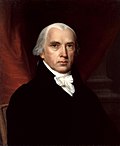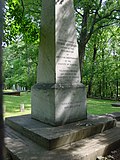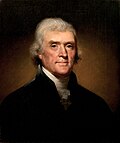First Amendment to the United States Constitution
| This article is part of a series on the |
| Constitution of the United States of America |
|---|
 |
| Preamble and Articles of the Constitution |
| Amendments to the Constitution |
|
|
| Proposed Amendments |
| History |
| Full text of the Constitution and Amendments |

The First Amendment to the United States Constitution is a part of the United States Bill of Rights that protects freedom of speech, freedom of religion, freedom of assembly, freedom of the press, and right to petition.
The Establishment Clause does not allow the government to support one religion more than any other religion. The government also can not say that a religion or a god is true. This is often described as "separation of church and state", where "state" means "The Government". It also does not allow the government to establish a national religion. It allows people to debate religion freely without the federal government of the United States getting involved. The clause did not stop the various states from supporting a particular religion, and several states did.
Congress shall make no law respecting an establishment of religion, or prohibiting the free exercise thereof; or abridging the freedom of speech, or of the press; or the right of the people peaceably to assemble, and to petition the Government for a redress of grievances..
First Amendment To The United States Constitution Media
George Mason was the principal author of the Virginia Declaration of Rights, adopted by the Fifth Virginia Convention on June 12, 1776.
James Madison, drafter of the Bill of Rights
The Maryland Toleration Act secured religious liberty in the English colony of Maryland. Similar laws were passed in the Rhode Island and Providence Plantations, Connecticut and Pennsylvania. These laws stood in direct contrast with the Puritan theocratic rule in the Plymouth and Massachusetts Bay colonies.
Thomas Jefferson's tombstone. The inscription, as he stipulated, reads "Here was buried Thomas Jefferson, author of the Declaration of American Independence, of the Statute of Virginia for Religious Freedom, and father of the University of Virginia."
An April 22, 1885, cartoon from Puck magazine depicting an army of clergymen assaulting a fortress defended by newspaper editors including from Puck, while atop a hill in the background a statue labeled "Constitution" that states "Congress shall make no law respecting an establishment of religion" can be seen.
President Thomas Jefferson wrote in 1802 of "a wall of separation".
The First Church of Christ, Scientist in Boston, Massachusetts
Bear Butte, in South Dakota, is a sacred site for over 30 Plains tribes.
Washington National Cathedral, the Episcopal cathedral in Washington, D.C.








